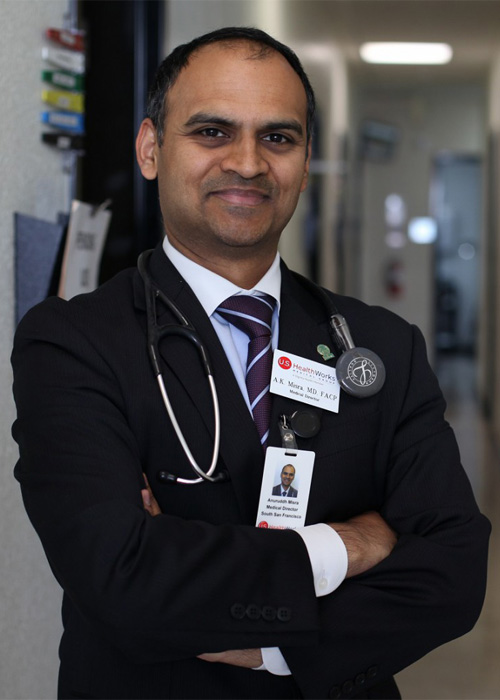
Health Tips brought to you by U.S. HealthWorks Medical Group. Our experienced medical experts provide information here that we hope will broaden your health care knowledge.
Today we talk to Dr. A.K. Misra, medical director for U.S. HealthWorks in South San Francisco, about the importance of breakfast. Dr. Misra is double-board certified in Sports Medicine and Internal Medicine.
Q: Is breakfast the most important meal of the day?
A: Yes and no. The very words itself – “break fast” – reference the first meal eaten after an interval of not eating, or of fasting. The meal is important for more than one reason. Breakfast has conventionally meant we should eat shortly after awakening because one has fasted overnight while sleeping.
What we specifically eat is key in ending this period of fasting. The actual elements of the meal itself are important. However, the mistake is many people eat breakfast foods that are counter-productive to one’s health and this typically inhibits weight loss. The notion of eating almost right after awakening was heavily promoted and propagated by the food industry for rather obvious reasons.
Q: What would you recommend for breakfast?
A: Unfortunately, because people are often in a hurry to get to work, school or somewhere else, breakfast foods are usually far from healthy. The foods consumed for breakfast are often the least healthy foods consumed all day. For example, muffins, donuts, fruit juices, bagels, and toast with jelly are common, and not good choices due to their high glycemic index and poor calorie-to-nutrition ratio.
Bagels are thought of as healthy, but they carry an extremely heavy carbohydrate load to the system. Other poor choices include processed meats, though for different reasons.
Whole fruit, cashews, avocados, almonds, soy milk, berries, and seeds are better choices.
Other reasonable choices include peanut or almond butter and yogurt with no added sugars. These products are often loaded with sugars that have many different types of names, so you must read the labels carefully to choose the ones that are sugar free.
Q: Can you lose weight on a low-calorie diet?
A: Weight loss can occur, but results have not shown the weight will remain off. Unfortunately, the more weight lost in this fashion, the slower the basal metabolic rate becomes – the baseline rate of burning calories at rest – and people are doomed to fail with very few exceptions.
In many instances, people not only regain the lost weight, but often gain more weight than prior to the low-calorie diet. This is why the popular TV show – The Biggest Loser – never has a reunion show, because it would demonstrate precisely this phenomenon .
A way around this conundrum of a slower metabolic rate, in response to losing weight, is intermittent fasting as touched upon in a prior blog of ours – Understanding the U.S. obesity epidemic.
Q: When did the concept of eating three meals a day start?
A: This concept is actually a rather modern development that started in the 1880s in Great Britain. Specifically, it started with the British Royal Navy in 1857 when the Navy started giving sailors a third meal each day on a square plate, hence the term “three square meals a day.” Until then, the British ate two meals a day.
While not unique to Great Britain, for generations many communities around the world formed their lifestyle around agricultural practices. In Great Britain, people used to get up very early in the morning to work in the fields until about 10 a.m. People would then return home from this physically demanding work and eat their first meal of the day.
They would eat their second, and final, meal of the day at around 4 p.m. before it got dark. That was it for the day – no snacking before going to bed.
With the advent of the third meal, the 4 p.m. time slot was replaced with “tea time” not only in Great Britain, but in much of the world that the country influenced, such as greater Europe, the Indian subcontinent, and some other parts of Asia.
Photos courtesy of Unsplash artists Carissa Gan, Joseph Gonzalez and Ali Inay.








